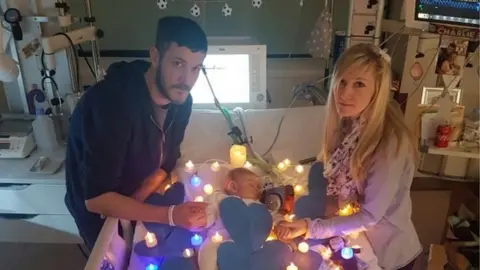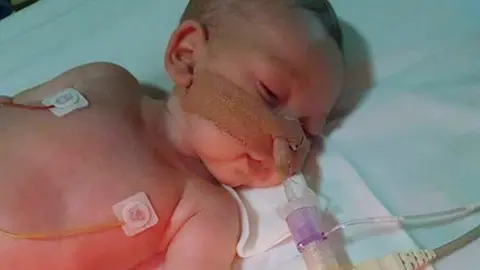The tragic case of Charlie Gard
 Featureworld
FeatureworldThe protracted and bitter dispute over Charlie Gard began with the breakdown in the relationship of trust between doctors and parents.
When his medical team, with second opinions from several leading centres, decided that his brain damage was irreversible, they believed there was nothing that could help him.
That was six months ago, but they had no power to end Charlie's life support without the backing of his parents.
That meant Great Ormond Street Hospital had to apply to the courts.
A succession of judges ruled it was in Charlie's best interests to die, because he may be suffering and the proposed experimental treatment in the United States was "futile".
Some commentators in the United States said Charlie's plight was the result of the UK having a state-run national health service.
Mr Justice Francis said that was "nonsensical".
Many will still question why Charlie's parents were not granted their wish to explore every option, even if the chances of improvement were slim.
'False hopes'
Connie Yates and Chris Gard were buoyed by support from an American neurologist, Prof Michio Hirano, who has pioneered an experimental treatment, a powder called nucleoside therapy.
But he gave his support without having requested Charlie's full medical records.
Dr Hirano was invited to examine Charlie in January and eventually did so in July.
 PA
PAThe guardian appointed to represent Charlie in court said if novel therapies were to be offered it was "imperative that those offering to provide them are fully aware of the clinical condition" so that "offers are made on an informed basis and without setting up false hopes and expectations".
In court, there was discussion of the differing ethical approaches to experimental treatment between the UK and the USA.
In the United States, it may be considered appropriate to give a patient a drug even though it cannot help them, on the grounds that it helps others in the future.
In the UK, patients cannot receive drugs that doctors know will not help them personally.
As well as the legal dispute, there was a second battle fought very effectively online by Charlie's parents.
They crowd-funded £1.3m, with more than 80,000 donations, and there were petitions and a Facebook site called Charlie's Army.
Moving images
The Pope and Donald Trump were among those who tweeted their support - Charlie's fate became an international issue with pro-life groups attaching themselves to the campaign.
The judge said it was one of the pitfalls of social media that the watching world felt it right to have opinions without knowing the facts of the case.
Doctors and nurses at Great Ormond Street, one of the world's most renowned children's hospitals, were subject to abuse and even death threats - which Charlie's parents condemned.
In such cases, medical staff always remain anonymous, but this made it hard to counter the repeated anguished public appeals by Charlie's parents, and the moving images of their son.
Great Ormond Street Hospital said Charlie's parents had tirelessly advocated for what they sincerely believed was right for their son and nobody could fault them for doing so.
The hospital said it would be giving careful thought to what it could learn from the "bruising" court case - and it added that everyone wished there could have been a less tragic outcome.
